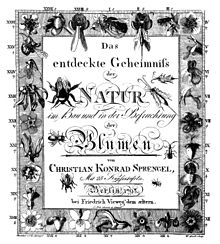Christian Konrad Sprengel
| Christian Konrad Sprengel | |
|---|---|

Cover page of Sprengel's landmark book (1793)
|
|
| Born | 22 September 1750 Brandenburg an der Havel |
| Died |
7 April 1816 (aged 65) Berlin |
| Nationality | German |
| Fields | natural history |
| Alma mater | University of Halle-Wittenberg |
| Known for | plant sexuality |
Christian Konrad Sprengel (22 September 1750 – 7 April 1816) was a German theologist, teacher and, most importantly, a naturalist. He is most famous for his research into plant sexuality. Sprengel was the first to recognize that the function of flowers was to attract insects and that nature favoured cross-pollination. Along with the work of Joseph Gottlieb Kölreuter he set the foundations for the modern study of floral biology and anthecology although his work was not widely recognized until Charles Darwin examined and reconfirmed several of his observations.
Sprengel was born in Brandenburg an der Havel in the Margraviate of Brandenburg. He was the 15th and the last son of a preacher Ernst Victor Sprengel and his second wife Dorothea Gnadenreich Schaeffer (died 1778). Ernst Victor's father was an organist and he himself was a choir-master, teacher and later archdeacon. Christian Konrad was also expected to continue in the same profession and he studied theology in Halle. In 1774 he became a teacher in Berlin. In 1780 he moved to Spandau to head the Great Lutheran Town School. His interest in plants began around the age of 30 when he was advised by his surgeon to spend as much time outdoors as possible to avoid irritation of the eyes. The surgeon was Ernst Ludwig Heim, an amateur mycologist and botanist who also influenced Alexander von Humboldt. Sprengel looked around at plants and collaborated with Carl Ludwig Willdenow on his Florae Berolinensis Prodromus (1787). Sprengel did considerable research on the pollination of plants and the interaction between flowers and their insect visitors in what was later called a pollination syndrome. With his work Das entdeckte Geheimnis der Natur im Bau und in der Befruchtung der Blumen (Berlin 1793), he was one of the founders of pollination ecology and floral biology as a scientific discipline. Together with one of his predecessors, Josef G. Köhlreuter, he is still the classic author in this field. While conduct his researches on plants, Sprengel appears to have neglected management of the school. The school mainly served the rich and powerful and Sprengel was accused of mistreating some of the students. He was accused of punishing a mayor's son by making him stand in class and he hit him with a stick leading to injury. A nine-year old son of a councillor was beaten up as also several other children. Sprengel was ultimately dismissed from service in 1784.
...
Wikipedia
